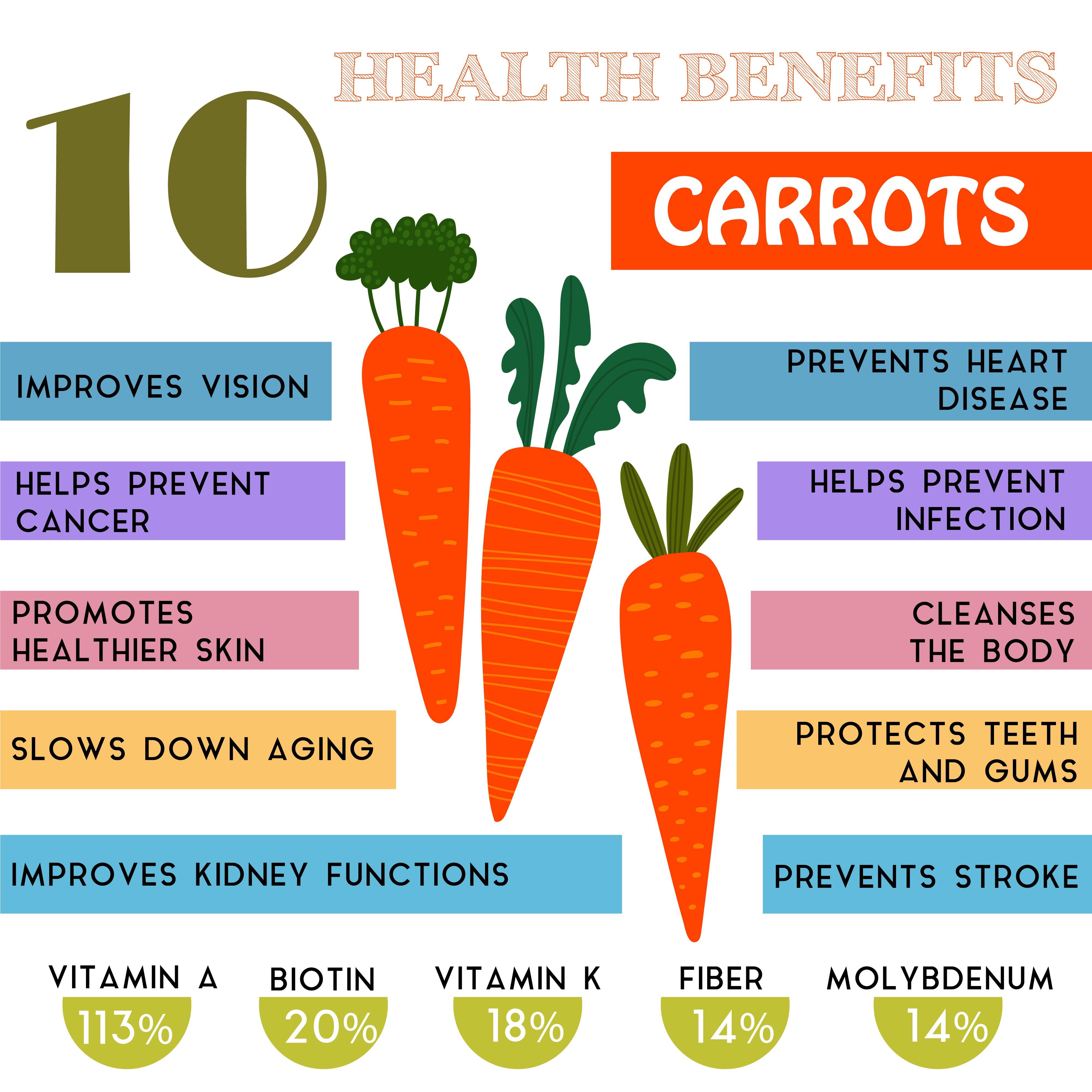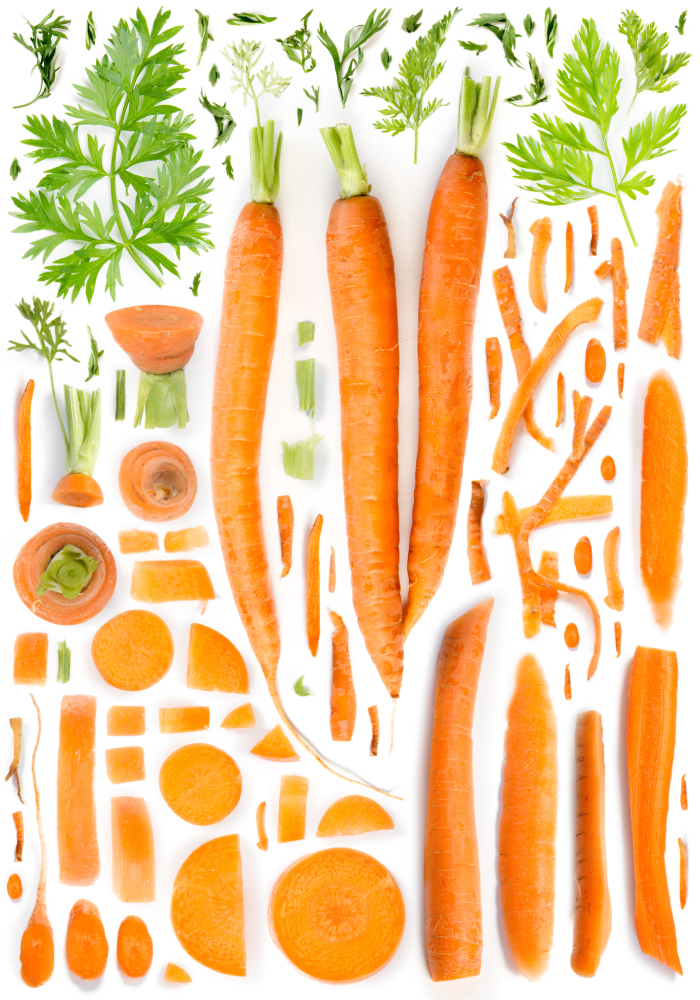Carrot is a vegetable whose medicinal properties and nutritional values are determined by vitamins, minerals and antioxidants. Among the latter, one of the more important is beta-carotene, which not only enhances tan, but also ensures the proper functioning of vision, strengthens immunity and can protect against the development of cancer. Check what other effects carrots have.
- What's up doc?
- Carrots as a treasury of beta-carotene
- Carrots for sunbathing and more
- Carrots - anti-cancer properties
- Cook the whole carrot!
- Carrots for atherosclerosis
- Carrots in digestive disorders in infants
- Only give carrots from crops without fertilizers to children!
- Carrots in a diabetic diet - yes, but only raw one
- Carrots increase the risk of developing type 1 diabetes?
- White, yellow, red, purple, black carrots
- Carrots for avitaminosis, malnutrition and anemia
- Carrots for pinworms and other parasites
- Carrots for the elderly
- Carrots - use in the kitchen
What's up doc?
Carrot is a vegetable whose properties and nutritional values have already been appreciated in ancient China. However, the white variety was the most well-known then. Orange carrots were bred by the Dutch only in the 17th century. It is still the most popular today, despite the fact that yellow, red and even dark purple and black specimens are available on the market. The orange variety of carrot is liked primarily by lovers of sunny baths, who believe that regular use of this colorful vegetable allows you to extend your tan. However, carrots should also be appreciated by people who have problems, including cardiac, with eyesight and skin.
Carrots as a treasury of beta-carotene
Carrots are a rich source of carotenoids - compounds that are both dyes responsible for the carrot's orange color and antioxidants. In carrots you can find all types of carotenoids - alpha-carotene, lutein and zeaxanthinand small amounts of lycopene. However, it contains the most beta-carotene - provitamin A, from which vitamin A is formed in the human body. It is worth knowing that carrot is one of the richer sources of beta-carotene. It can be found (although not in such quantities) in spinach and kale - in which beta-carotene is masked by chlorophyll - as well as in pumpkin and red pepper.

Carrots for sunbathing and more
Beta-carotene ensures the proper functioning of the eyesight, strengthens immunity, and also supports the treatment of acne and delays the appearance of wrinkles. However, it is best known for accelerating tanning and prolonging the effects of sunbathing. It is widely believed that you should drink 2 glasses of carrot juice every day to enjoy the sun-kissed skin. However, do not overdo it with the amount, because then you will not achieve a beautiful tan, but the skin will acquire a carrot color over time (so-called carotenosis or carotenemia). In addition, excessive consumption of beta-carotene means that the body is over-producing vitamin A, which is not good for health. Too much vitamin A is toxic and can lead to liver enlargement, hyperactivity, skin diseases, and vision disorders.
Carrots - anti-cancer properties
Beta-carotene is an antioxidant, which means it can prevent the development of cancer. It has been proven that it can reduce the incidence of cancers such as cancer of the mouth, larynx, esophagus and bladder.
University of York researchers argue that carrots can also reduce the likelihood of prostate cancer. All thanks to the content of another compound with anti-cancer effect - retinoic acid, which is a metabolite of vitamin A.
Another substance contained in carrots that can protect against cancer is falkarinol - scientists from the University of Newcastle came to this conclusion. According to their research, falkarinol reduces the risk of developing cancer by up to 33 percent. It is worth knowing that falkarinol can also be found in celery, parsley and other vegetables.
Cook the whole carrot!
When British scientists examined the content of falkarinol in a carrot that was cut before cooking, it turned out that it contains 25% less of this beneficial ingredient than whole-cooked carrots. When we cut the carrot, the surface exposed to high temperatures increases and during cooking the vegetable loses more nutrients. If we cook it whole, we will enclose not only the nutrients, but also the taste - says Dr. Kirsten Brandt from the University of Newcastle.
Carrots for atherosclerosis
Pectins contained in carrots lower blood cholesterol and prevent atherosclerosis. Therefore, modern phytotherapy recommends using carrots in the beginning of atherosclerosis. In turn, carrot fruit extracts are given orally in light, chronic conditions for coronary artery disease. However, in severe cases only as an auxiliary and supportive medicine. Carrot fruit, which contains flavonoid syndrome, has antispasmodic effect on the coronary vessels of the heart 2.5 times stronger than theobromine (a substance used to treat coronary artery disease) and increases blood flow to the heart muscle.
Carrots in digestive disorders in infants
Fresh carrot roots and the resulting juice contain specific sulfur compounds, called bifidus agents. They stimulate the growth of Bifidobacterium bifidum (syn. Lactobacillus bifidus) and fight digestive disorders in children. For this reason, in natural medicine, pulp from fresh roots or squeezed carrot juice is given in digestive disorders to infants, especially when they are not fed mother's milk. Carrot juice - as a vitamin and digestive aid - it is recommended to give babies orally in an amount of 20-40 g per day (however, it must be divided into 2 or 3 servings). Small children can be given 40-60 g of juice a day, divided into 2 or 3 portions.
Only give carrots from crops without fertilizers to children!
When giving carrot extracts to infants and young children, and even adults, it is important that the carrots come from allotment gardens, home gardens or crops that have not used mineral fertilizers, especially nitrogen fertilizers, because carrots grown on these fertilizers can cause symptoms of intolerance. and even dangerous poisoning.
Carrots in a diabetic diet - yes, but only raw one
Raw carrots have a low glycemic index (IG = 30), but the more overcooked, the more its value increases. IG of cooked carrot can be up to 90. Therefore, people with type 2 diabetes can eat carrot only uncooked.

Carrots increase the risk of developing type 1 diabetes?
Genetic and autoimmune factors play an important role in the development of type 1 diabetes. Researchers from Finland argue that eating is one of them. In their opinion, the early (before 4 months of age) introduction of carrots, potatoes (or other root vegetables) to the diet of children with genetic predisposition to type I diabetes may contribute to the development of this disease. The research was conducted on a group of over 6,000 such children, and their health was monitored from birth. Mothers recorded when and what products they introduced into their kids' diet, and scientists took blood samples from babies every few months to test for antibodies to pancreatic islets. In 265 children, at least two types of these antibodies or full-blown type 1 diabetes were found. The analysis showed that introducing root vegetables into the child's diet before the 4th month of life increased by over 70%. risk of developing pancreatic autoaggression or type 1 diabetes. This association was independent of other food products.
White, yellow, red, purple, black carrots
Carrots in white, yellow, red, fillet and black are also available on the market. The last two varieties contain anthocyanins - vegetable dyes and at the same time compounds with strong antioxidant properties. Their high content in these varieties of carrot has a positive effect on the health-promoting properties of this vegetable. The red carrot is also unique, because of its lycopene content (this compound is also responsible for the color of tomatoes). The yellow variety, on the other hand, contains beta-carotene, though not as much as the orange variety. In contrast, white carrots, whose properties were so appreciated in ancient China, contain all the nutrients present in traditional carrots except beta-carotene.
Carrots for avitaminosis, malnutrition and anemia
Carrots contain not only beta-carotene, but also other vitamins and mineral elements, thanks to which it is used in avitaminosis A, i.e. vitamin A deficiency. This condition manifests itself in very dry skin on the elbows and knees, as well as on the shoulders and thighs (dryness does not disappears after applying cream or lotion), amblyopia at dusk and at night, and dry eye.
In addition, carrots can be given to young children and adolescents in cases of malnutrition, anemia, and skin inflammation.
Carrots for pinworms and other parasites
In natural medicine, the anthelmintic effect of carrot is also known, which is why the pulp from this vegetable is used as an auxiliary against pinworms and human lump.
Carrots for the elderly
For the elderly, carrots are given as a dietary agent, improving intestinal motility and increasing immunity.
Carrots - use in the kitchen
Carrot is not only a proven ingredient in soups, salads and salads. Carrot-based desserts can also be prepared. Carrot cake is very popular in Switzerland.
In turn, in the United States, a carrot cake is baked, which tastes like something between a gingerbread and a nut cake. In Portugal, the national product is carrot jam, by which carrot is considered a fruit.






